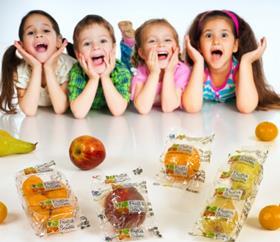
Renewable and compostable film specialist Innovia Films has revealed that its compostabl, cellulose-based NatureFlex NVS compostable film material is helping top spread the message of healthy eating in Italian Schools by being part of the EU-funded 'Frutta nella Scuole' (School Fruit Scheme).
The co-funded EU School Fruit Scheme ensures children aged 6-11 years old are given individually wrapped portions of fresh, organic fruit to eat during the school day.
According to Innovia, transparent NatureFlex NVS Film used in the application is converted and sold to packers by Italian company Corapack, founded by Massimo Radice and boasting much experience in perforating and printing various flexible films.
'NatureFlex NVS was the ideal choice to flow wrap the fruit as it not only protects the produce inside, due to its semi-permeability to moisture, but also provides good machinability and printability, ensuring a nice pack appearance,' says Fabrizio Radice, sales manager for Corapack. 'In addition the film has excellent environmental attributes such as being compostable and made from renewable resources.'
NatureFlex begins life as a natural product – wood from managed plantations operating on good forestry principles – and is certified compostable in both home and industrial composting environments and is also suitable for anarobic digestion, Innovia explains. The product offers advantages for packing and converting, such as 'inherent dead fold and antistatic properties, high gloss and transparency, resistance to grease and oil, good barrier to gases, aromas and mineral oils, and a wide heat-seal range'.
'We are very happy to be involved in this project supporting our customer, Corapack, who promoted the use of our NatureFlex film for the Frutta nelle Scuole project,' adds Giorgio Berton, technical service and development specialist at Innovia. 'This scheme encourages school children to eat fresh organic fruit, which stays in premium condition due to being wrapped in NatureFlex.'
The allocation of EU aid under the School Fruit Scheme for the 2012/13 school year was announced by the European Commission in March, having been backed by member states and the management committee.
Funding will see €90m allocated to 24 participating member states,with Sweden, Finland and the UK opting not to participate. The main beneficiaries of the scheme will be Italy, which will receive over €20.5m, followed by Germany (€11.6m), Romania (€9.8m), Poland (€9.2m), France (€5.6m) and Spain (€4.8m). Funding needs to be co-funded at rates between 50 per cent and 75 per cent, matched by either national and/or private contributions.



